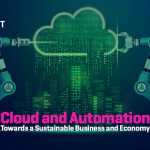Data protection will be a key focus

Having an adequate data protection strategy in place will be a leading focus for business executives going into 2023. Over the course of the last two years, cybersecurity and data protection have quickly become top boardroom priorities for global enterprises. Data is considered to be the bloodline of most businesses, and boardroom executives are looking at how they can protect it and avoid hefty data compliance fines, as well as the dangers of ransomware and other cyber threats.
Compliance will also be another top-of-mind area for business and tech executives. Elements of this will include having greater visibility over company and customer data, ensuring data processing is legitimate, upholding individual privacy rights, and ensuring data processor and data controller roles are fulfilled to meet the compliance requirements of the UAE.

Cloud storage has revolutionised working practices, not least over the last two years, when remote working meant employees needed easy access to data, no matter where they were located. As a result, organisations have become increasingly reliant on public cloud services to share and store vital documents, generally using more than three cloud providers in tandem. While analyst house Gartner, forecasts that in 2023, worldwide public cloud spending will grow 20.7% to total $591.8 billion, up from $490.3 billion in 2022.
As we look back at 2022, it is clear that the field of artificial intelligence has made some very important strides. There is no doubt that AI will continue its explosive growth into 2023. The newer AI-based technologies introduced to the sector like ‘distributed cloud’ have given rise to the ease of access to massive data through digital transformation. AI and ML will drive the next wave of ransomware protection.
It is now widely accepted that data is the beating heart of any organisation. It not only comprises the entirety of the organisation’s operational history, but also enables them to predict the future by examining trends in their own data. A firm cannot function if its crucial data is lost because data serves as the proof of events and facts.
Businesses in the Middle East that have not already done so, need to put a comprehensive data protection management system in place to safeguard it. You cannot protect what you cannot see, so the first step to any comprehensive data management strategy is gaining insight into all your data – what it is, where it is and what it is worth.
From an organisational perspective, every single person in the company is responsible for contributing to the success of a data protection strategy, and organisations that deploy clear guidance and training on the type of data that can be shared across various communication tools will benefit.
However, the real onus lies with the IT team which must remain vigilant and test that data protection management policies work as other employees meet the requirements of their own job descriptions.
And, for the already squeezed IT department to survive and thrive, enterprises need to abandon point solutions that only work for one use case and embrace platforms and portfolios that can support their increasingly heterogenous environments. This includes implementing platforms that can offer availability, protection, and intelligence across edge, core, and multi-cloud environments.
As leaders in enterprise data protection, we are also here to draw attention to the fact that, if businesses do not adequately address the unprecedented growth of dark data, data that is not used in any way to generate insights or for decision-making, it poses a serious threat to the environment. According to Veritas’ Databerg research, 52% of all information stored by organisations is considered dark data, and storing it resulted in 6.4 million tonnes of CO2 unnecessarily pumped into the atmosphere in 2020.
Modernising the data centre is undoubtedly beneficial, but companies may also make a significant impact by simply taking control of their data, evaluating their storage policies, and making sure they are not keeping data that is no longer required, reducing harmful emissions.
The Veritas vision is built on a strategy for Autonomous Data Management ADM, where the solutions will use AI and machine learning to self-provision, self-optimise and self-heal. Equipping businesses to be agile and adaptive without putting pressure on human resources.
This strategy is founded on Cloud Scale Technology, a containerised, cloud-optimised reimaging of the software underpinning our market-leading NetBackup solution.
In 2023, Veritas is set to continue to deliver updates that fulfil their vision for their customers and partners in the Middle East region, including deeper integration across even more multi-cloud environments, further autonomy of data management, and new services that reduce the burden on IT staff.
At the same time, Veritas will help companies to identify and reduce the impact of cyber threats through increased visibility across their technology estate, delivering secure backup and fast data retrieval in the case of a cyber-attack, and, continue to simplify compliance and help customers reduce complexity as they transition to the cloud.
Key takeaways
- Veritas vision is built on a strategy for Autonomous Data Management.
- Solutions will use AI ML to self-provision, self-optimise and self-heal.
- This will equip businesses to be agile and adaptive without putting pressure on human resources.
- Veritas strategy is founded on Cloud Scale Technology, a containerised, cloud-optimised reimaging of software.
- Businesses that have not already done so, need to put a comprehensive data protection management system in place.






